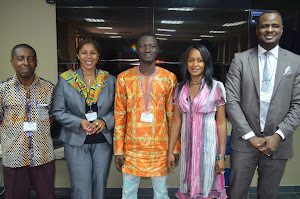BY EDMUND SMITH-ASANTE
Environment Ministers of three nations, senior United Nations and international officers, have urged all stakeholders across Africa to make commitments, as part of the Action Agenda, on how to achieve sustainable energy for all by 2030.
The ministers made the call at an event marking the Africa rollout of the International Year of Sustainable Energy for All at the UNEP headquarters in Nairobi, Kenya on February 22, 2012.
Making her submission, H. E. Ms. Terezya Luoga Hovisa, Minister of State, Ministry for Environment, Tanzania and Vice-President, the African Ministerial Conference on the Environment (AMCEN) highlighted the enormous renewable energy potential ranging from solar, geothermal, hydro, wind and modern biomass that can be harnessed to achieve universal access to energy.
“I call upon all actors to work together to implement the commitments outlined in the 2011 Johannesburg Declaration of the Africa Energy Ministers Conference,” Hovisa said.
For his part, H.E. Erik Solheim, Minister of Environment and International Development, Norway, stated that “Private sector involvement is essential to create more growth and less poverty, contributing to the huge need for investments in Africa, adding, Norway’s Energy+ initiative intends to contribute to the implementation of Sustainable Energy for All.”
Speaking from the Brazilian experience with “Luz Para Todos,” H. E. Izabella Teixeira, Minister of Environment, Brazil, highlighted the importance of political involvement to trigger action by all stakeholders, emphasising the need to look at energy within the context of the food, water and energy nexus.
“Sustainable access and use of energy are part of the green economy,” Teixeira said, disclosing, “Energy will be at the centre of discussions at the upcoming Rio+20 UN Conference on Sustainable Development.”
Also making inputs, Achim Steiner, Executive Director of the United Nations Environment Programme (UNEP), and Adnan Amin, Director General of the International Renewable Energy Agency (IRENA), emphasised the importance of energy for economic and social development across the continent, to improve the lives of the poorest in a more sustainable manner.
They opined that investments in clean energy allow countries in the region to harness substantial renewable energy resource endowments and leapfrog to modern and efficient infrastructure development.
The two leaders referred to many examples that are implemented throughout the region already and that should be replicated and scaled up.
To that end, Steiner and Amin called attention to the Sustainable Energy for All initiative launched by UN Secretary-General Ban Ki-moon, which is a unique partnership between business, government and civil society and designed to achieve sustainable energy for all by 2030.
The Secretary-General has three interlinked objectives for his initiative, which are: to ensure universal access to energy, double the global rate of improvement in energy efficiency, and double the share of renewables in the global energy mix, by 2030.
Steiner, who also serves as a UN Under-Secretary-General, called for implementation of the initiative’s “Framework for Action,” designed to guide the work of governments, the private sector and civil society, as they mobilise, facilitate, and monitor efforts to expand energy access, promote efficiency standards and policies, and strengthen investment in renewables.
Speaking about the Secretary-General’s initiative, Steiner said, “Engagement by the private sector is essential to boost economic growth and reduce poverty. It will help address the huge need for investments in Africa and mobilise the action necessary to provide universal access to modern energy services.”
Adnan Amin also spoke about the immense potential for significantly increasing investment in renewable energy based on establishing an enabling policy environment and enhanced capacity.
In this regard, Kenya is paving the way for other African nations with its pledge to be kerosene-free by 2018 and in its use of wind and geothermal energy to power municipalities.
However, because of the central role that energy plays in society, the UN Secretary-General has appointed a High-level Group of distinguished leaders from finance, government, the private sector and civil society, to drive action towards the complementary objectives of energy access, renewables and efficiency and Steiner and Amin are both members of this group.
However, because of the central role that energy plays in society, the UN Secretary-General has appointed a High-level Group of distinguished leaders from finance, government, the private sector and civil society, to drive action towards the complementary objectives of energy access, renewables and efficiency and Steiner and Amin are both members of this group.
Meanwhile, globally, one person in five lacks access to modern electricity, and nearly three billion people rely on wood, coal, charcoal or animal waste for cooking and heating.
Other leaders speaking in the rollout event for the 2012 UN International Year of Sustainable Energy for All, in addition to the leaders above, were: H. E. Dr. Elham Mahmood Ahmed Ibrahim (Mrs.), Commissioner, Infrastructure and Energy, African Union Commission; Ms Mariam Sow Soumare, Representing Dr Mayaki, CEO, New Partnership for Africa’s Development; Mr. Carlo van Wageningen, Chairman and spokesperson, Lake Turkana Wind Power and Mr. Negash Engedasew, Manager, Department of Energy, Environment and Climate Change, African Development Bank.








